Coley Running Wild: The Blade and the Whip

![]() collects the mini-series “Return to Voodoo Island” and “Idol of Flesh”
collects the mini-series “Return to Voodoo Island” and “Idol of Flesh”
After reading and enjoying John Blackburn’s series Hardthrob, featuring the dangerously beautiful Coley Cochran, I was curious to read some of his other adventures. Fortunately, two of them are collected in Coley Running Wild, part of Eros’ “graphic album” series. There are 30 over-sized square-bound albums in the series, most of which are obviously written and drawn for a straight male audience. While a few of them have a “lesbian lust” or “bisexual babes” angle to them (catering to the strangely-common straight male fascination with female/female sex), the Coley book is apparently the only one aimed at bisexual or gay men. (As I noted in my review of Hardthrob, the sex is not exclusively male/male, so if female/male sexuality (or a bit of female/female) turns you off, you may find yourself turning some pages.)
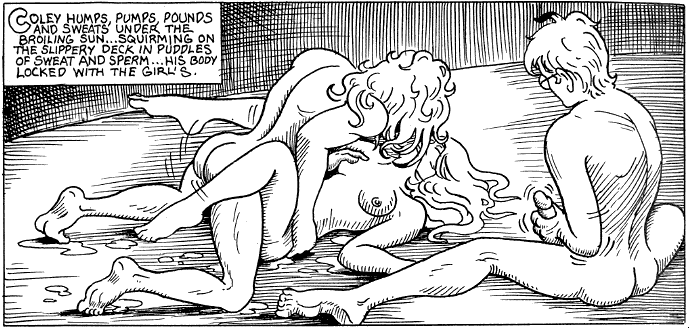
The opening page of “Return to Voodoo Island” explains that 19-year-old Coley was once abducted on a Caribbean cruise and transformed into a beautiful, mesmerizing sex god. (I’m assuming that this “secret origin” story was told previously elsewhere.) As you might guess from the title of this segment, it is the story of his return to the place where this happened. It’s a story of danger and intrigue, all revolving around the hunky blonde porn star and his friends.
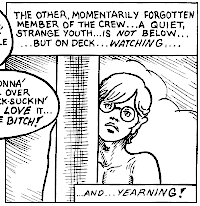 Coley is traveling by boat with his lover Harry Larue (an aging movie star), his co-star (and sex partner) Lon, and their playgirl friend Kit. Their arrival at the island and the beginning of their time there provide an opportunity for John Blackburn to flesh out the characters a bit. For the most part, that means explaining Coley’s hedonistic, devil-may-care attitude toward sex (and other people) and how it fits in contrast with his seemingly selfless acts of bravery and compassion. I’m not sure I buy this paradox as anything more than an excuse to let Coley do completely outrageous things while keeping him likeable, but as a character gimmick, it’s OK. And it provides an excuse for why Coley hardly ever wears clothes, and gives him an opportunity to tease and entice nearly every character he comes into contact with… as well as the reader. {grin}
Coley is traveling by boat with his lover Harry Larue (an aging movie star), his co-star (and sex partner) Lon, and their playgirl friend Kit. Their arrival at the island and the beginning of their time there provide an opportunity for John Blackburn to flesh out the characters a bit. For the most part, that means explaining Coley’s hedonistic, devil-may-care attitude toward sex (and other people) and how it fits in contrast with his seemingly selfless acts of bravery and compassion. I’m not sure I buy this paradox as anything more than an excuse to let Coley do completely outrageous things while keeping him likeable, but as a character gimmick, it’s OK. And it provides an excuse for why Coley hardly ever wears clothes, and gives him an opportunity to tease and entice nearly every character he comes into contact with… as well as the reader. {grin}
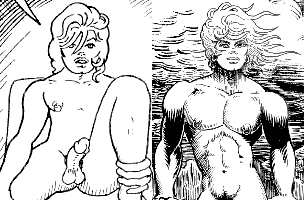 Blackburn’s art is generally quite good, but for some reason, it varies wildly in detail and quality from one page to another. Certain pages are painstakingly modeled “pin-up”s that people would probably pay real money to have framed and hung on their wall; others look like hasty throw-away pencil sketches with the outlines inked. What’s odd is that I can’t see a clear pattern to it… it doesn’t seem to matter whether it’s a steamy sex scene or just talking heads; any page (except for the obvious pin-ups) might get the quick-and-sloppy treatment. Fortunately, most of the art is somewhere between Blackburn’s two extremes and closer to the “good” end. And when he draws Coley well, you can see why both women and men find him irresistible. These pages in particular make the oversize format of these Eros collections worth the somewhat high price ($16.95 for 144 pages).
Blackburn’s art is generally quite good, but for some reason, it varies wildly in detail and quality from one page to another. Certain pages are painstakingly modeled “pin-up”s that people would probably pay real money to have framed and hung on their wall; others look like hasty throw-away pencil sketches with the outlines inked. What’s odd is that I can’t see a clear pattern to it… it doesn’t seem to matter whether it’s a steamy sex scene or just talking heads; any page (except for the obvious pin-ups) might get the quick-and-sloppy treatment. Fortunately, most of the art is somewhere between Blackburn’s two extremes and closer to the “good” end. And when he draws Coley well, you can see why both women and men find him irresistible. These pages in particular make the oversize format of these Eros collections worth the somewhat high price ($16.95 for 144 pages).
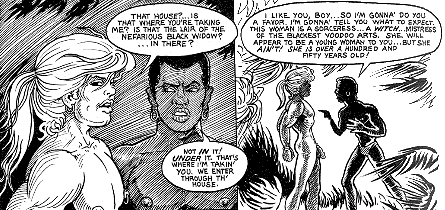 The, um, climax of the story is a confrontation between Coley and the Black Widow, a woman of unknown mystical powers who wants Coley’s cock… in more ways than one. Coley is seemingly at her mercy (of which she has none), but manages to turn the tables on her at the end. Be warned: This part gets a bit violent and gruesome, so if you’re the squeamish type, you might want to steer clear.
The, um, climax of the story is a confrontation between Coley and the Black Widow, a woman of unknown mystical powers who wants Coley’s cock… in more ways than one. Coley is seemingly at her mercy (of which she has none), but manages to turn the tables on her at the end. Be warned: This part gets a bit violent and gruesome, so if you’re the squeamish type, you might want to steer clear.
Surprisingly, the anti-climax of the story is not a sexual anti-climax. (”But wait… there’s more!”) There’s a bit of sucking and fucking that takes place as the ties get loosened and a few loose ends get tied. And Coley is ready and eager to embark on a new adventure…
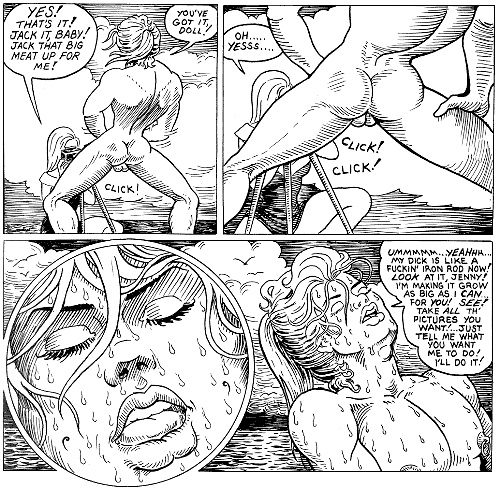 Idol of Flesh
Idol of Flesh
The story that follows brings Coley back to mainstream North American society. And what would western society be without ancient religious institutions and the entertainment media? Well, they’re both here for Coley to play off of. The media is represented by Jessica, a photographer or Playthings magazine (a more hardcore Playgirl). Religion comes into play (initially) in the form of Jerry, a Roman Catholic priest Coley apparently, um, knows.
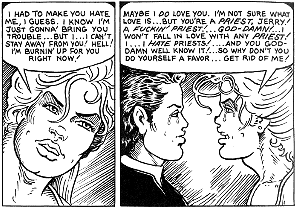 Even more than “Return to Voodoo Island”, this story showcases Coley as the amoral, sexually manipulative character he is. He flirts with and teases Jennifer, dragging her unwittingly into the fatally dangerous, morally ambiguous swamp he lives in. I don’t care what anyone says; going at it hot-and-heavy on a speeding motorcycle is not safe sex. {grin}
Even more than “Return to Voodoo Island”, this story showcases Coley as the amoral, sexually manipulative character he is. He flirts with and teases Jennifer, dragging her unwittingly into the fatally dangerous, morally ambiguous swamp he lives in. I don’t care what anyone says; going at it hot-and-heavy on a speeding motorcycle is not safe sex. {grin}
Along the way, he selfishly manipulates his priest pal Jerry. In case the death-defying-tempting stunts weren’t enough to certify Coley as psychologically unstable, his hate/love relationship with Jerry would. And despite the tears he sheds, it’s difficult not to hold Coley in contempt for the way he treats this man of the cloth and the consequences of it. But the underlying message of all the blasphemy and blazes is that Coley = Danger. Exciting, eh?
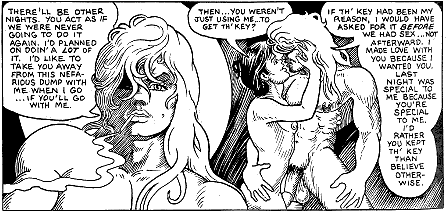 But then again… Coley can be so wonderfully sweet and tender. It’s not his fault that people can’t resist him, and that evil stalks him and anyone near him. Is it?
But then again… Coley can be so wonderfully sweet and tender. It’s not his fault that people can’t resist him, and that evil stalks him and anyone near him. Is it?
In any case, before long, Coley again finds himself embroiled in a visciously lustful scheme to possess him and his sexual power. This time the “bad guy” is, in fact, a guy, so any misogynist subtext is attached to the villain instead of the (anti)hero. The stakes keep going up here, making “Return to Voodoo Island” seem like a sitcom of fairy tale in comparison. Everyone does not life happily ever after. The climactic scene (which in this case really is just before the end of the story) is rather overtly sadomasochistic, and culminates in what appears to be the end of the Coley saga. Or not. This is fantasy, after all.
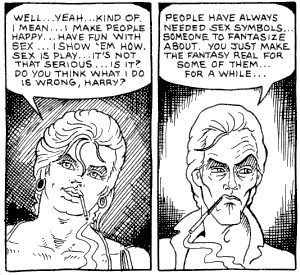 With that fact in mind, it’s hard to find too much fault with Blackburn’s stories featuring Coley the teenage sex god. The characterisation may not be consistent, and the plots a bit contrived. But if he were to “fix” these, the books would probably lose a lot of what makes them work as fantasy. If reality worked this way, we wouldn’t need fantasy.
With that fact in mind, it’s hard to find too much fault with Blackburn’s stories featuring Coley the teenage sex god. The characterisation may not be consistent, and the plots a bit contrived. But if he were to “fix” these, the books would probably lose a lot of what makes them work as fantasy. If reality worked this way, we wouldn’t need fantasy.
And believe me: reading about Coley is a lot safer than dating him would be. {grin}
